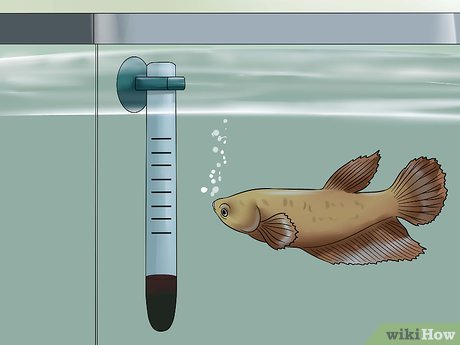Betta fish are one of the most popular aquarium pets around the world. These beautiful and vibrant fish require special care and attention to thrive in their environment. One of the most important factors that can affect their health is the water temperature. If the water is too cold, it can have a negative impact on their overall well-being. In this article, we will explore the steps you can take to keep your betta fish safe when the water temperature is too cold.
As a responsible betta fish owner, it is crucial to understand the ideal temperature range for your fish and how to maintain it. We will discuss the causes and symptoms of low water temperature and provide practical tips on how to increase the temperature safely. With our expert advice, you can ensure that your betta fish stay healthy and happy in their aquarium. So, let’s dive in and learn how to keep your betta fish safe when the water temperature is too cold.
If the water temperature in your betta fish tank is too cold, it can be harmful to your fish’s health. To keep your betta fish safe, you should first check the temperature with a thermometer and make sure it’s between 78-82°F (25-28°C). If the temperature is too low, you can use a heater to raise it to the appropriate level. It’s important to monitor the temperature regularly and adjust the heater as needed to maintain a consistent temperature for your betta fish.

Keeping Your Betta Fish Safe: What to Do When the Water Temperature is Too Cold
Understanding the Ideal Water Temperature for Your Betta Fish
Betta fish are native to the warm waters of Southeast Asia, so it’s essential to maintain the right temperature in their tanks to keep them healthy and active. The ideal temperature range for betta fish is between 76°F and 82°F. Any temperature below 74°F can be dangerous for betta fish, and they may become sluggish and prone to diseases.
To ensure that your betta fish are healthy, you need to invest in a good-quality aquarium heater. This device can help regulate the water temperature in your tank and keep it within the desired range. It’s also essential to monitor the temperature regularly to ensure it’s consistent and doesn’t fluctuate too much.
Why Is Cold Water Dangerous for Betta Fish?
Betta fish are cold-blooded creatures, and their body temperature is directly related to the temperature of the water they live in. When the water is too cold, their metabolism slows down, and they become less active. This can lead to a weakened immune system, making them more susceptible to diseases.
In extreme cases, cold water can also cause betta fish to go into shock, which can be fatal. If you notice your betta fish acting lethargic or not eating, it’s essential to check the water temperature and take appropriate action.
What to Do When the Water Temperature is Too Cold?
If the water temperature in your betta fish tank is too cold, there are several things you can do to raise it to the desired level:
- Invest in a good-quality aquarium heater: This is the most effective way to regulate the temperature in your betta fish tank. Make sure you choose a heater that’s appropriate for the size of your tank and has a built-in thermostat to ensure consistent temperature.
- Move the tank to a warmer room: If the room temperature is too low, it can affect the water temperature in your tank. Consider moving the tank to a warmer room or using a room heater to raise the temperature.
- Use a heat lamp: If you’re unable to use an aquarium heater, you can use a heat lamp to warm up the water. Place the lamp above the tank and monitor the temperature regularly.
The Benefits of Maintaining the Right Water Temperature
Maintaining the right water temperature in your betta fish tank has many benefits, including:
- Healthy and active fish: Betta fish thrive in warm water, and maintaining the right temperature can help keep them healthy and active.
- Disease prevention: A consistent water temperature can help prevent diseases and infections in betta fish.
- Improved digestion: Betta fish are prone to digestive problems, and a warm water temperature can help improve their digestion and nutrient absorption.
Conclusion
Maintaining the right water temperature is crucial for the health and well-being of your betta fish. If the water temperature is too cold, invest in a good-quality aquarium heater, move the tank to a warmer room, or use a heat lamp to raise the temperature. By taking appropriate action, you can ensure that your betta fish remain healthy and active.
Frequently Asked Questions
What is the ideal water temperature for Betta fish?
Betta fish are tropical fish and prefer water temperatures between 75-80°F. It is important to maintain a consistent temperature as fluctuations can cause stress and illness in your fish. Using a heater with a thermostat is the easiest way to ensure a stable temperature in your Betta’s tank.
If your Betta’s water temperature is too cold, it can lead to a weakened immune system, slower metabolism, and even death. Therefore, it is crucial to monitor the temperature regularly and take necessary steps to maintain the right temperature.
What should I do if the water temperature is too cold for my Betta fish?
If the water temperature is too cold for your Betta fish, the first thing you should do is invest in a heater. A heater will help regulate the temperature and keep it within the ideal range for your fish. You can also try moving the tank to a warmer room in your house or placing a towel around the tank to insulate it.
It’s important to avoid sudden temperature changes, so make sure to adjust the temperature gradually. If your Betta fish is showing signs of stress or illness, consult with a veterinarian or an experienced fish keeper.
What are the signs of stress in Betta fish due to cold water temperature?
When Betta fish are exposed to cold water temperatures, they may show signs of stress. Some of the common signs include lethargy, loss of appetite, clamped fins, and increased susceptibility to illness. The fish may also become less active and spend more time at the bottom of the tank.
If you notice any of these signs, it is important to take action immediately. Invest in a heater to regulate the temperature and monitor your Betta’s behavior closely.
How can I prevent the water temperature from getting too cold?
To prevent the water temperature from getting too cold, it is important to keep the tank away from windows and drafts. You can also invest in a thermometer to monitor the temperature regularly and adjust the heater accordingly.
If you live in a colder climate, consider investing in an aquarium water heater with a higher wattage to maintain a stable temperature. It’s also important to keep the tank clean and well-maintained, as dirty water can lead to fluctuations in temperature and stress in your Betta fish.
Can I keep Betta fish with other tropical fish if I use a heater?
Yes, you can keep Betta fish with other tropical fish if you use a heater to maintain a consistent water temperature. However, it’s important to research the specific needs of each species and make sure they are compatible.
Betta fish are known for their aggressive behavior, so it’s important to choose tank mates that are peaceful and won’t bully your Betta. Some good choices include neon tetras, guppies, and cory catfish. Always introduce new fish to the tank slowly and monitor their behavior closely.

What Temperature should a Betta Tank be? 🔥 IS YOUR BETTA WATER TOO HOT?
In conclusion, maintaining a safe water temperature is crucial for the survival and well-being of your betta fish. If you notice that the water temperature is too cold, take immediate action to warm it up. You can use a heater or adjust the location of the tank to a warmer spot in your home.
Remember, prevention is key. Always monitor the temperature of the water and make sure it stays within the recommended range. This will not only keep your betta fish safe, but also help them thrive and live a long, healthy life.
Lastly, don’t hesitate to seek help or advice from a professional if needed. Your local pet store or veterinarian can provide valuable insights and recommendations on how to care for your betta fish and ensure their safety in all seasons. With these tips in mind, you can keep your betta fish safe and happy for years to come.
